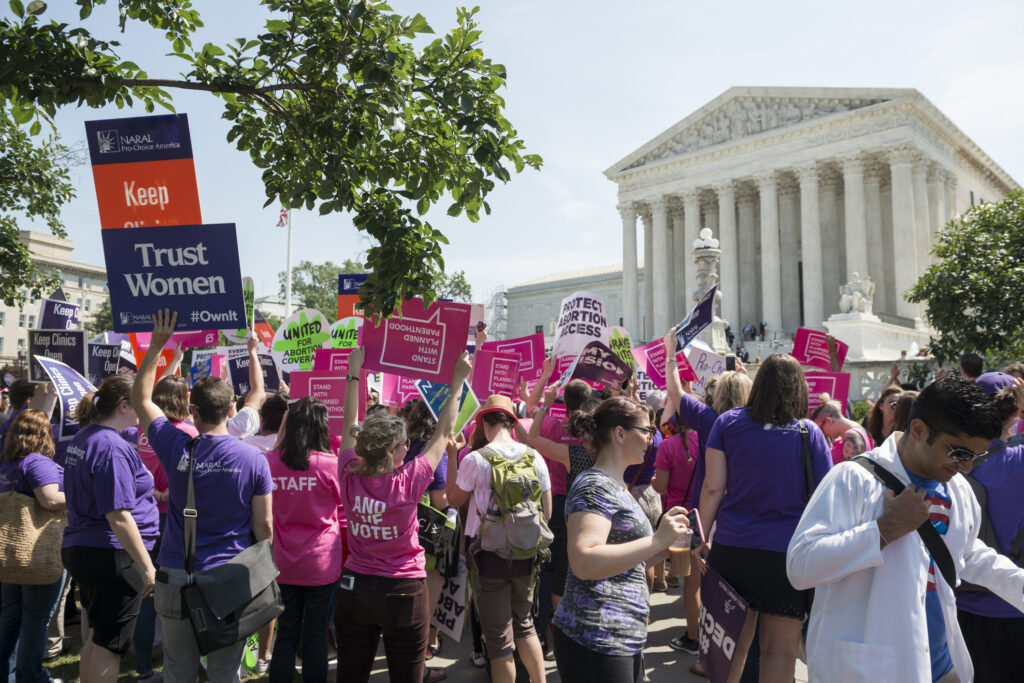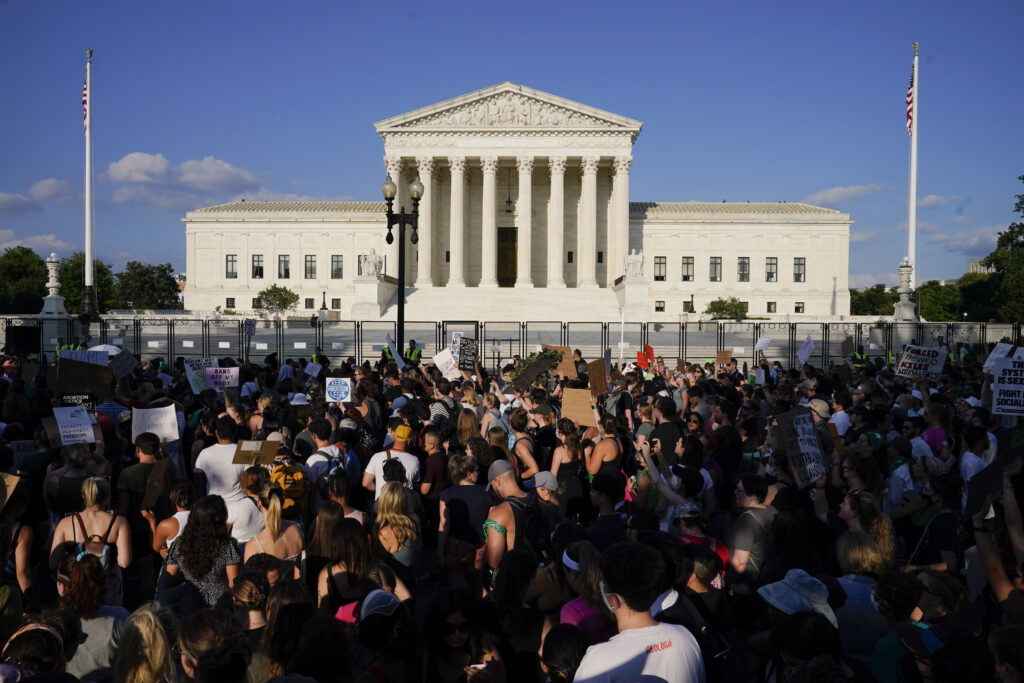
On June 25, 2022, the United States Supreme Court issued its ruling for Dobbs v. Jackson Women’s Health Organization, a case that challenges Mississippi’s restrictive abortion law. The law bans most abortions after 15 weeks (about 3 and a half months) of pregnancy, with limited exceptions for medical emergencies or severe fetal abnormalities. The case has generated significant attention and controversy, with many people viewing it as a potential threat to reproductive rights in the United States.
At the heart of the controversy surrounding Dobbs v. Jackson is the issue of political polarization in America. The case highlights how deeply divided the country has become on issues of reproductive rights, with Democrats and Republicans taking distinctively different positions on the topic. The extremely polarized political environment in the United States has resulted in members of each party deeming their counterparts as threats to American values and ways of life.
The political polarization in America is not a new phenomenon, but it has become more magnified in recent years. In the years following Roe v. Wade, abortion became a central issue in American politics. Carrying on to the 21st century, abortion has become increasingly politicized, with politicians on both sides of the aisle using the issue to rally their base and gain political advantage.
Republicans have generally taken a more conservative stance on abortion, seeking to restrict access to the procedure and overturn Roe v. Wade. Speaking on behalf of the Supreme Court, conservative Justice Alito stated, “procuring an abortion is not a fundamental constitutional right because such a right has no basis in the Constitution’s text or in our Nation’s history.” [1] Democrats, on the other hand, have been more supportive of reproductive rights, advocating for access to safe and legal abortion and pushing back against efforts to restrict it. Liberal Attorney General Garland from the US Department of Justice said, “The Justice Department strongly disagrees with the Court’s decision. This decision deals a devastating blow to reproductive freedom in the United States.” [2] The political polarization surrounding Dobbs v. Jackson is evident in the reactions to the case from political leaders and interest groups.
The roots of the political polarization on abortion go back decades. In the 1970s, the Supreme Court handed down its landmark decision in Roe v. Wade, which established a woman’s right to choose to have an abortion. In the following years, political polarization surrounding abortion intensified with the rise of the so-called “culture wars.” The issue became increasingly tied to broader debates over morality, sexuality, and family values, with conservative politicians and religious leaders framing it as a central front in the fight against what they saw as the moral decay of American society. In response, pro-choice advocates worked to mobilize support for reproductive rights, framing the issue as a matter of women’s health and autonomy. They pointed to the dangers of unsafe abortions and argued that women should have the right to make their own decisions about their bodies and their lives.
Even with all the controversy surrounding Roe v. Wade in the 21st century, it quickly became a symbol of women’s reproductive rights and earned a reputation as an integral part of American cultural memory. In more recent years, the landmark case has been commemorated and remembered through popular culture, protests, museum exhibits, and political campaigns. For example, on the 39th anniversary of Roe v. Wade, Mitt Romney stated, “Today marks the 39th anniversary of one of the darkest moments in Supreme Court history, when the court in Roe v. Wade claimed authority over the fundamental question regarding the rights of the unborn. The result is millions of lives since that day have been tragically silenced. Since that day, the pro-life movement has been working tirelessly in an effort to change hearts and minds and protect the weakest and most vulnerable among us.” [3] Throughout the 21st century, Roe v. Wade was a central symbol for the ongoing debate about abortion and women’s reproductive rights, however, the polarization was always undermined by the decision given by the Supreme Court regarding Roe v. Wade. Despite fierce opposition from pro-life groups, Roe v. Wade remained in place, ensuring that women in the United States have the right to choose what they want to do with their bodies.

The Dobbs v. Jackson case, however, is a sign of an ever changing and divided landscape which we call American politics. The recent ruling has raised concerns among advocates of reproductive rights, as it represents a potential threat to precedent set by Roe v. Wade that has become embedded in our cultural memory. Political polarization was evident not only in ideological debates but also in the responses of states to the Dobbs v. Jackson decision. States that are predominantly Republican, such as Tennessee, Alabama, and Idaho, have implemented bans on abortion, while predominantly Democratic states like Oregon and New Mexico have imposed no restrictions. [4] [5] The disparity amongst states reactions to the decision handed down by the Supreme Court reflects the political polarization that has manifested in the United States.
The return of power to individual states regarding abortion regulation leaves the future of reproductive rights uncertain. This is likely to maintain the current polarization on the issue, with advocates for both sides continuing to push for their positions. Dobbs v. Jackson marks a significant event in the timeline of women’s reproductive rights, which will be long remembered. However, it remains to be seen whether the impact of political polarization will persist in shaping the ongoing discussion surrounding reproductive health.
Abhiram Bolisetty
Sources
[1] “Explaining SCOTUS’s Abortion Decision in Dobbs v. Jackson Women’s Health Organization.” League of Women Voters, 2021, https://www.lwv.org/blog/explaining-scotuss-abortion-decision-dobbs-v-jackson-womens-health-organization.
[2] “Attorney General Merrick B. Garland Statement on Supreme Court Ruling in Dobbs v. Jackson Women’s Health Organization.” U.S. Department of Justice, 2022, https://www.justice.gov/opa/pr/attorney-general-merrick-b-garland-statement-supreme-court-ruling-dobbs-v-jackson-women-s.
[3] Romney, Mitt. “Statement on the 39th Anniversary of Roe v. Wade.” The American Presidency Project, University of California Santa Barbara, 22 Jan. 2012, https://www.presidency.ucsb.edu/documents/statement-mitt-romney-the-39th-anniversary-roe-v-wade.
[4] Murtha, Molly. “A Guide to Abortion Laws by State.” U.S. News & World Report, 14 Dec. 2021, https://www.usnews.com/news/best-states/articles/a-guide-to-abortion-laws-by-state.
[5] “Party Affiliation by State.” Pew Research Center’s Religion & Public Life Project, 2022, https://www.pewresearch.org/religion/religious-landscape-study/compare/party-affiliation/by/state/.
[6] “Mississippi Abortion Ban: Dobbs v. Jackson Women’s Health Organization.” Center for Reproductive Rights, 2021, https://reproductiverights.org/case/scotus-mississippi-abortion-ban/.
[7] “What Should Philosophers Do in Response to Dobbs? A Conversation with Ethicists.” Blog of the American Philosophical Association, 25 July 2022, https://blog.apaonline.org/2022/07/25/what-should-philosophers-do-in-response-to-dobbs-a-conversation-with-ethicists/.
[8] Martin, Jacquelyn. “Protesters Fill the Street in Front of the Supreme Court After the Court’s Decision to Overturn Roe v. Wade in Washington.” Alamy, 24 June 2022, https://www.alamy.com/file-protesters-fill-the-street-in-front-of-the-supreme-court-after-the-courts-decision-to-overturn-roe-v-wade-in-washington-june-24-2022-support-for-abortion-rights-drove-women-to-the-polls-in-tuesdays-elections-but-for-many-the-issue-took-on-higher-meaning-part-of-an-overarching-concern-about-the-future-of-democracy-women-especially-democratic-women-were-more-likely-than-men-to-say-the-roe-v-wade-reversal-was-a-top-factor-in-their-voteap-photojacquelyn-martin-file-image505226478.html.
I like how you presented two Supreme Court cases, one on each side of the abortion debate, and used them to discuss the political polarization that has persisted throughout American history. I believe this post demonstrates the subjective nature of memory; depending on where you are on the political spectrum, you will view historical events differently, but the political actions you help set into motion will differ as well. For example, you will support or oppose/try to prevent abortion laws based on your political affiliation, and will agree or disagree with such legislation being passed retrospectively.
Your piece was very thoughtful and detailed, and Abortion has indeed become a fissure point for the growing polarization in American politics. So much so that has spurred people to become single-issue voters. Some people will vote for a candidate that shares no other values besides their stance on abortion. I find your selection of Mitt Romney’s quote about the “rights of the unborn” particularly interesting. Mitt Romney has recently gotten a lot of heat from members of his own party because he has detracted from the base in many ways. He presents himself as a devout, ethical man. He was the only Republican to vote twice to impeach Trump. He was one of few to condemn the January 6th Insurrection. Condemned as a “RINO,” Romney has gone on record chastising his own party for its betrayal of its once-held values, “character,” “reform” free trade, and “balancing the budget.” However, he is a devout member of the LDS church and pretty outspoken on abortion, he recently put out a statement of support for the Dobbs decision. However, this wasn’t always the case. A Republican PAC for abortion rights (RMC), connected to Senators Lisa Murkowski and Susan Collins, put out messaging depicting his past support for legal abortion access. He flip-flopped. While perhaps it was an earnest change of heart, a relatively moderate man himself making such an abrupt turnaround can symbolize the deepening anti-abortion sentiment throughout the whole Republican party. Arguments about abortion have absolutely intensified in the past 20 years, being both a product and a factor into America’s deepening polarization.
The polarization of abortion by congressional leaders is an interesting change. The majority of Americans support allowing abortion in some, not all cases. However, politicians have become polarized and have committed to ensure there are either no restrictions on abortion (Democrats), or abortion is outlawed (Republicans). What is missing is the middle view that the majority of Americans are in favor of. Mike Pence spoke on UNC’s campus on April 26th, 2023. He said In general the politicians are far more divided than their constituents. I concerned about this, and curious how we got to this place.
I like the way you write and present the different sides of the argument and who is fighting for what. I do think that we should be better at considering who is on the other side of those disagreements. While everyone has super different opinions on the matter, I don’t believe the people are divided as the current politics and news landscape might have you believe. I have seen a lot of don’t ask don’t tell when it comes to political opinions. It seems that the people want to love and get along with each other but as soon as political opinions get involved it becomes easy for relationships/friendships to blow up. I just wonder what we might do to unite the people even though their opinions are so polarized. I think it would not be good for the future of the American people if these disagreements go much further.
Political Polarization in the United States has been one of the biggest problems over the last century. People are more concerned with keeping their political party in the lead instead of working together to make much-needed changes throughout the country. It has gotten to a point where people may go against their own personal beliefs if they feel that it might set their party back as a whole. There once was a time when would see conservative democrats and liberal republicans, but this has become extremely rare today because people feel like they might become a hindrance to their party. We even see this reflected in different states. States with Republican leadership tend to pass more anti-abortion laws, while states with Democratic leaders seem to fight for reproductive freedoms. But, we may never know their true beliefs because they want to stay on the “good side” of those who support their party.